'Random Acts of Violence' director Jay Baruchel unpacks his true crime obsession (exclusive)
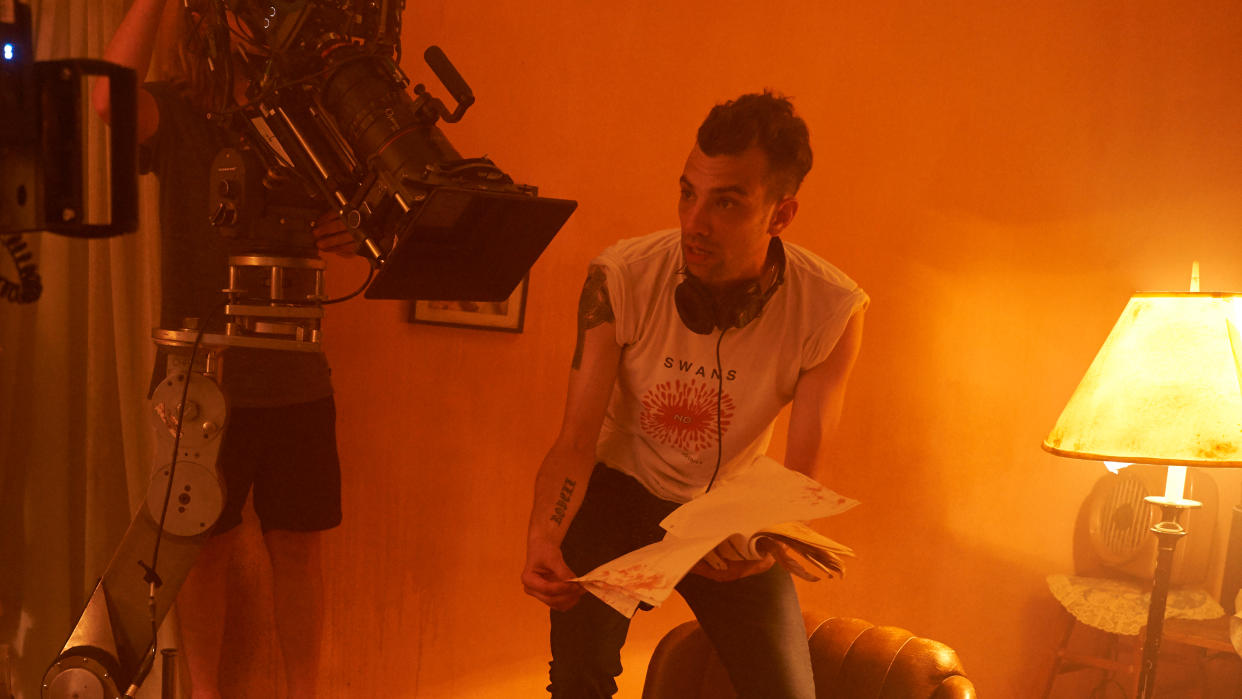
Jay Baruchel was able to critique and scrutinise his own obsession with true crime stories while directing his new movie Random Acts of Violence.
The film, which debuts on horror streaming service Shudder, follows the comic book writer behind an acclaimed true crime series as he considers the impact of his work in the wake of a copycat killer’s emergence.
Read more: Best true crime documentaries available to stream
Baruchel told Yahoo Movies UK he has always been a fan of true crime tales, but has begun to question that affection.
“As I got older, I found this need to try to reconcile — and if not reconcile, then at least temper — my fascination with my morals,” he said.
“I would be watching or reading something and I’d ask myself how I would feel if this was my mother or my sister or somebody else that I really cared about.

“Would I think that they were talking about them with the appropriate amount of solemnity? And if not, how would that land? It would probably feel kind of gross.
“Then that kind of crashed into this whole other line of thinking, which was how come I can name a bunch of serial killers and even some of their stats like they’re hockey players, but I can’t name any of the people that they f***ing brutally murdered?”
Read more: Ted Bundy’s girlfriend reveals all in doc series
The 38-year-old filmmaker, directing his second feature after Goon: Last of the Enforcers, said this problem also applies to slasher movies in which the serial killers are the recognisable characters, dispatching anonymous victims.
He added: “I definitely just realised that we must always be careful not to turn killers into monsters and not turn victims into statistics. I think that’s an absence of humanity in both cases.
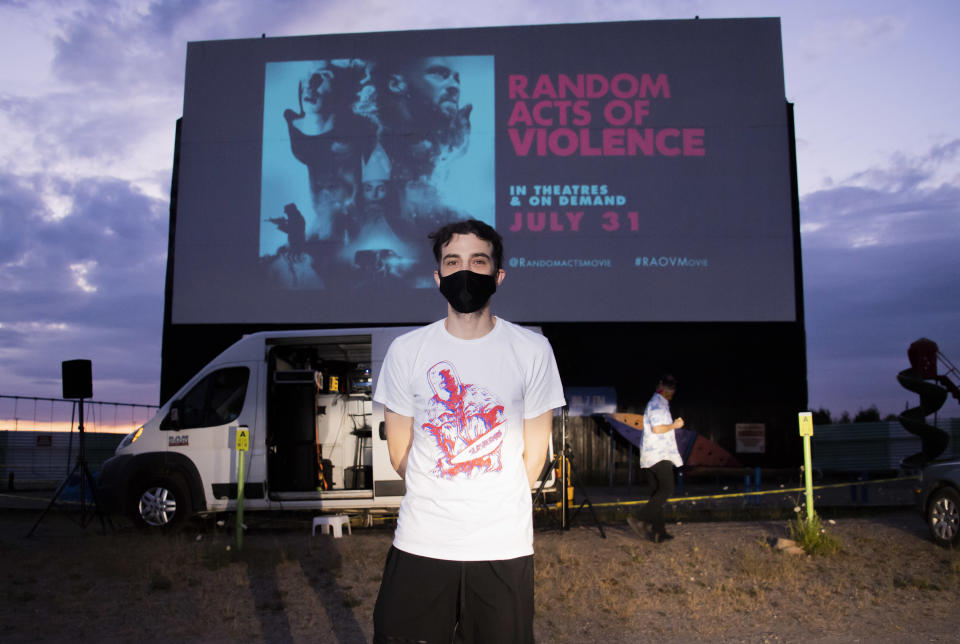
“When we make a serial killer into the Zodiac, writ large, they then loom over culture like Jack the Ripper.
“This is not a man any more, this is a monster, and once it’s a monster then it’s palatable. And it shouldn’t be.”
Read more: Lady Gaga in talks for true crime role
As well as serving as director and co-writer, Baruchel also stars in Random Acts of Violence as the publicist of Jesse Williams’s comic book writer.
Read our full interview with Jay Baruchel, in which he discusses the expectation of comedy in his work, the lessons he learned from his directorial debut and the perfect length for a horror movie...
Yahoo Movies UK: I think people might be surprised to see you do this project, given that you’re mostly known for comedy and this is very much a horror film?
Jay Baruchel: Yeah, there aren’t many jokes in this movie. That’s for sure.
I’ve seen some people describe it as a horror-comedy, and I don’t think it is. I wonder if, just because you’re involved, that’s how people have decided to categorise it?
I certainly never said that and that was certainly never our goal. I think that’s just a function of people’s pre-conceived notions and expectations. It certainly is not a horror-comedy. It certainly is not Shaun of the Dead. But I guess people assume that the kind of movies I’ve made are the type of movies I’m super into.
Read more: How Hitchcock once called Psycho a comedy
I adore the movies I’ve been in and I’m really proud of the movies I have gotten to be a part of, but this is far more indicative of the s*** that I would watch at home on my own.
Obviously you act in this movie too. Was there ever a question of you playing the lead role instead?
It came up, but it would be a fate worse than death for me. It’s a small movie and, in a small business, you’re sometimes forced to wear multiple hats in the interest of efficiency — and that was this. For whatever reason, my name and face still has some degree of currency in film finance and so it helped get the thing going.
I give the performance I enjoy the least in it and, if I never have to edit myself again, it’ll be too soon. It is a deeply humbling process to just stare and to f***ing sort through rushes to find five seconds where your mouth was closed. It’s horrible.
I think the subject matter here is really interesting and timely. The graphic novel has obviously been out for quite a long time, but the film feels very timely for now given its questioning of our obsession with true crime. Just a few months ago, we all spent a week watching Tiger King. How important was that theme for you?
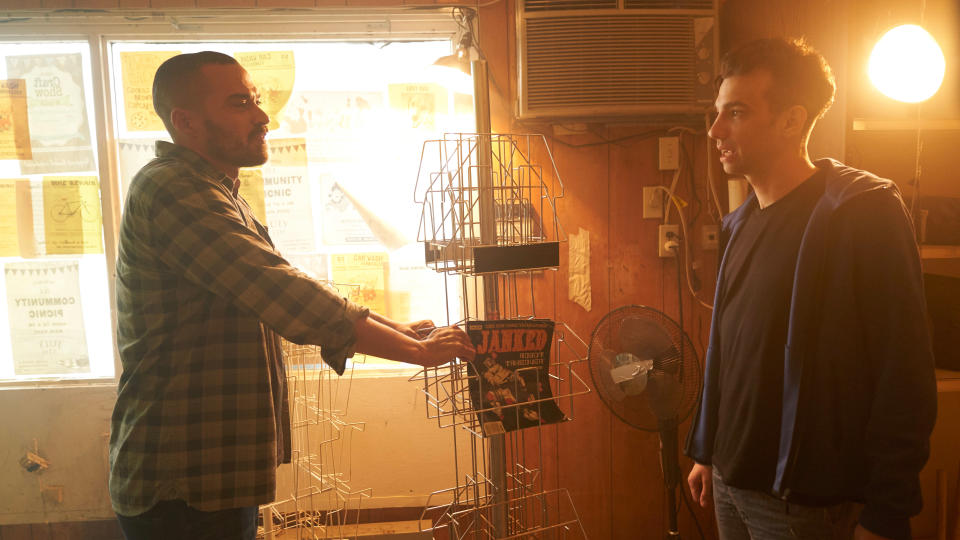
It was significantly important. I’m an avid true crime fan. I come by it honestly because my mother was really interested in that s*** throughout all of my life. I get the fascination because I suffer from it as well. But as I got older, I found this need to try to reconcile — and if not reconcile, then at least temper — my fascination with my morals.
I would have these moments where I would be watching or reading something and I’d ask myself how I would feel if this was my mother or my sister or somebody else that I really cared about. Would I think that they were talking about them with the appropriate amount of solemnity? And if not, how would that land? It would probably feel kind of gross.
Then that kind of crashed into this whole other line of thinking, which was how come I can name a bunch of serial killers and even some of their stats like they’re hockey players, but I can’t name any of the people that they f***ing brutally murdered?
Read more: Who’s the deadliest horror movie icon?
And further, how come I can name killers in a bunch of movies, but I can’t name any of their victims? And if that’s true, if I can name Jason or Freddy but I can’t really name any of the people they killed, their victims are probably not the leads of those things. The killers are probably the “heroes” of those stories. If that’s the case, then what is that experience as a viewer? So it was an effort to temper and try to just unpack why I’m drawn to the stuff I’m drawn to.
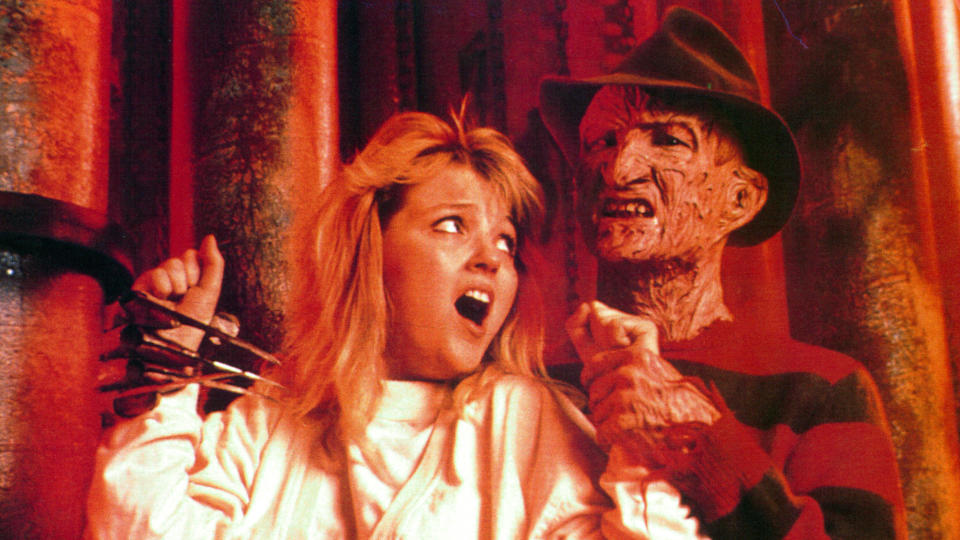
And did you find that your opinion on that altered or changed at all? Was there anything in particular you learned while making the film?
I definitely just realised that we must always be careful not to turn killers into monsters and not turn victims into statistics. I think that’s an absence of humanity in both cases. When we make a serial killer into the Zodiac, writ large, they then loom over culture like Jack the Ripper. This is not a man any more, this is a monster, and once it’s a monster then it’s palatable. And it shouldn’t be. This is an awful f***ing broken mind and it should be dealt with as such. The same thing implies to the fact we should know and appreciate and respect the experience of the people who suffered this s***.
I’ll credit Alan Moore in From Hell and Ann Rule in her Green River Killer book for starting to point me in that direction. In From Hell, Moore goes to great lengths saying that it doesn’t really matter who Jack the Ripper was. We are obsessed with finding this out as the third act reveal that never happened. But it doesn’t really matter, he says. What matters is what happened to these women and the social conditions that allowed for this to happen to them. It’s a book about the class system more than anything.
And in Ann Rule’s Green River Killer book, I don’t know that she even names the killer fully. What she does is give you a bunch of chapters, each of which is a biography of one of his victims. You know how each of these biographies ends, but she wants you to understand that they, like anybody, had friends and family, had victories and defeats, had heartbreaks, had triumphs, they laughed, they got treated poorly. All of these different things that make up a life, all of these victims had that and then they were robbed of it.
That experience is at the very least worth shining a light on, next to this cult of personality that we build around pretty much anybody that kills more than one person.
I think all of that comes through really strongly in the movie. Visually, I think it’s really interesting. The material is obviously really dark, but there’s a lot of colour to the movie. It’s not a washed-out serial killer film of the kind we’re used to seeing.
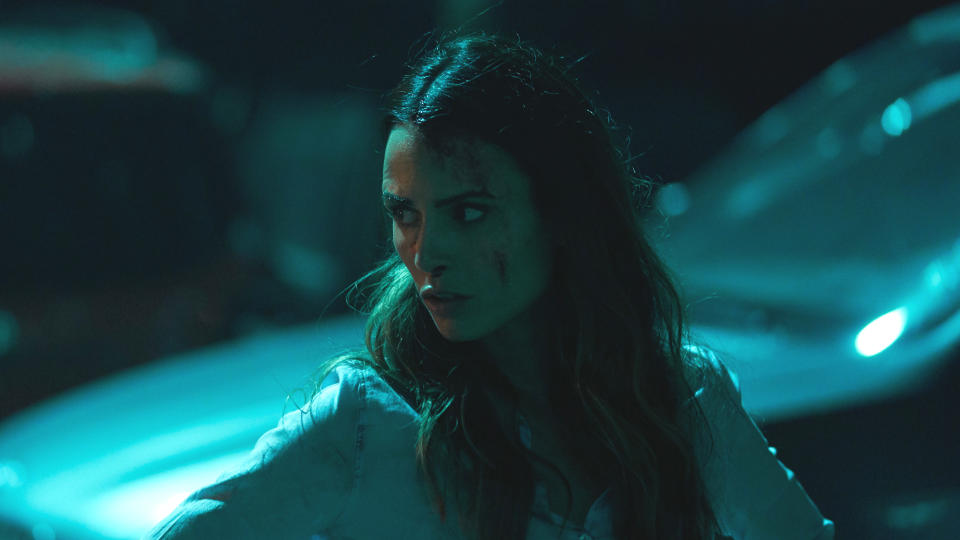
No, not at all. The look of the thing, I swear to God, we started talking about it on day one of pre-production. My cinematographer, Karim [Hussain], rolled up and we have known each other since I was 16. It was especially cool because, back in the day, he was co-founder of my favourite film festival Fantasia, which I’ve been queuing up at since I was 14. So here was the nerd from the line outside the theatre and the programmer of the festival getting to f***ing make a movie together.
We walked up, gave each other a hug and he was like “here are my instincts: fire and water, cyan and amber”. I swear to God, this is outside the production office on day one. He hadn’t even got inside the building yet. The one really big instinct I had was a sort of slightly violet pink — the kind of hue you get when all of the multi-coloured Christmas lights are firing at once and you look at the wall behind the Christmas tree. That was in the thing in a big way to me and that pink is on the same side of the colour wheel as amber, while cyan is green and there’s a great deal of Christmas in the movie’s DNA too, so that makes a lot of sense.
Read more: Best horror movies of 2019
The fact that we both got there or version of there on our own told us that it was something to think about. Then when we tested these looks and these colours out, we realised how impactful they were. It wasn’t just “this looks cool”, because that’s not reason enough, but it looked cool and had an emotional resonance to it. We dug the effect and found it was the right one. It didn’t step on any of the s***t we wanted to do. It just increased it. I think also we both prefer and are interested in colour in cinema. Maybe that’s a reaction to 20 years of desaturation, but that’s how we were wired and we got there on day one.
This is not the first time you’ve been in a director’s chair. What did you learn from making the Goon sequel [in 2017] that you were able to apply this time around?

The biggest one was that, on Goon 2, we didn’t finish our shot list by the time prep was done. This time, Karim and I got through six drafts of our shot list before prep was done. It wasn’t like, on Goon, we kept going into s*** with zero instincts for what it should be, but it was just a behemoth, that movie. We just did our homework in a massive way [this time].
I also knew how to parcel out my anxiety a bit better, having gone through the process from A to Z once before and knowing that it’s a series of marathons. Prep is long, production is long, the edit is even longer, posting is long and then the thing comes out and you’ve got to hustle it. There was a million different times where I was either like “finally, I’ve made it” or “kill me, I’m in hell”. So just knowing that that’s part of the f***ing process, I was able to stiff upper lip it a bit better and also pace myself, knowing that this is a year-plus process.
Goon was very much a comedy and this is very much a horror. Do you have a preference from a directorial point of view in terms of genre?
Oh yeah. If I ever get to make any more movies. Every movie is a miracle and I take nothing for granted. The fact that I’ve somehow been able to convince people to let me make two is f***ing insane. All I have ever wanted to do is make horror movies and action movies. That’s the s*** I’m most interested in. I can’t see myself ever making a movie where somebody didn’t get their a** kicked at the very least.
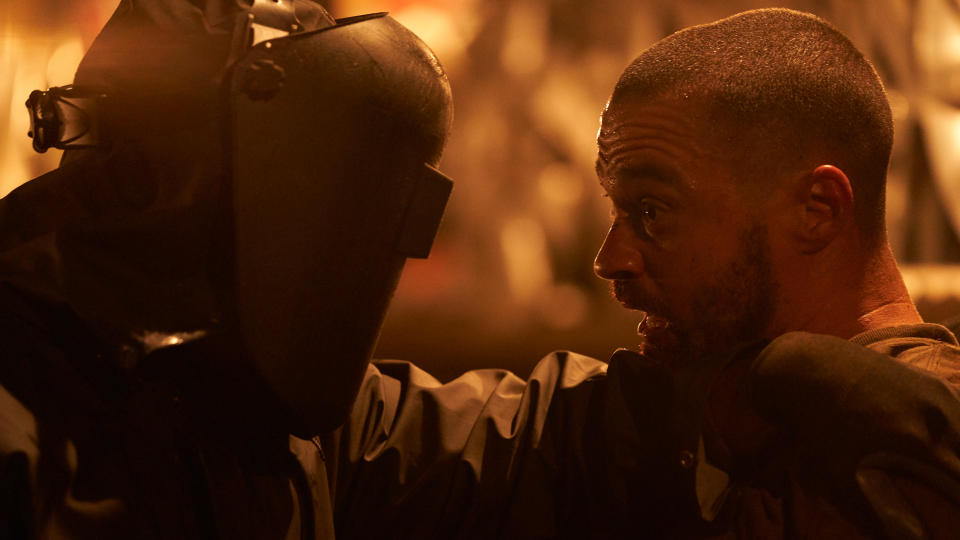
That ties in to the thing I wanted to ask next. One of the things I always enjoy talking about with people who’ve made horror films is their approach to the gore effects. As a filmmaker, that’s got to be a tonne of fun?
Oh it’s the best. It’s super fun. It is the purest extension of both playing cops and robbers with your friends in the backyard and doing yourself and the house up for Halloween. In my house, Halloween was literally second only to Christmas. My mother always went super hard on our costumes and there was always a s***-tonne of blood.
So when you’re doing that s*** on set and you’re working with really beautiful prosthetics and everyone is trying to time and figure out one little trick, it’s the coolest. You’ve got a bunch of people, all with a shared interest and investment in pulling off a gag. That’s what it is. Everything we do is a version of sleight of hand. It’s a magician on a stage making something disappear or appear. Everything in movies is a version of that. It is the most fun.
Read more: Inside the practical effects secrets of Arachnophobia
And then it gets super fun when you try to figure out a way to do it that is not only new, hopefully, and not new for the sake of new, but new because you watch other movies and you’re like “this isn’t landing the way that I would want it to land”. So very quickly we decided we wanted our kills to not feel like sequences. We wanted to bury our choreography and wanted it to feel like mayhem unfolding through its own f***ing energy.

We wanted to take out any sense of fun or construction. Because, if you’ve ever watched any movie, the minute a car chase starts to happen you immediately on the inside start going “this is the next four to seven minutes of my life”. The minute the killer is in the house, you’re like “this is the next four to seven minutes of my life” because you’ve been through sequences before.
So we tried our best to mitigate the sequence-ness of our sequences and just tried to make them feel like mayhem that was unfolding. We wanted to take as much security and control away from the audience as possible.
This is quite a short and sharp movie, coming in just under 90 minutes. Do you think that’s the sweet spot for horror?
I think it’s certainly the sweet spot for this movie. I don’t know that I have any blanket opinions on running time. Every movie is its own kind of thing. There are movies that are four hours that I f***ing love as much as movies that are 90 minutes or less. As long as everything that’s supposed to be in there is in there, you want to do that as tight as f***ing possible.
That’s not to say there isn’t a need or a place for pause and for what people call shoe leather but, if the thing is the thing at 80 minutes, there’s no f***ing reason it should be 81.
Random Acts of Violence is available to stream via Shudder now.

 Yahoo Movies
Yahoo Movies 
